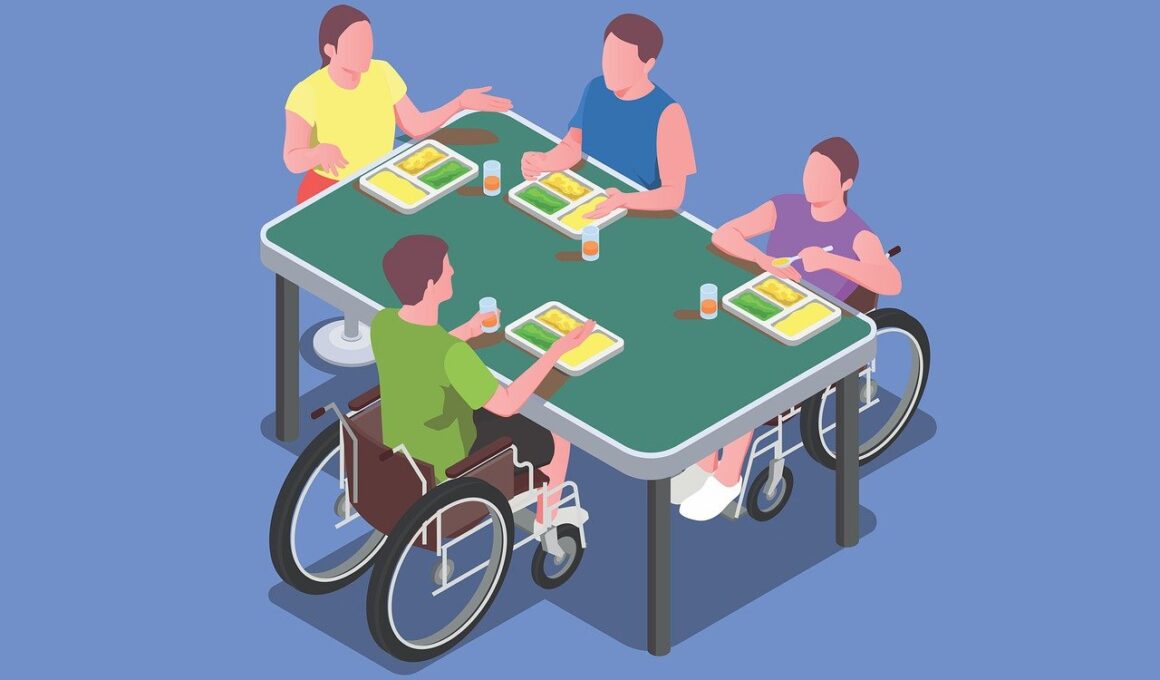Innovative Solutions to Challenges in Adaptive Fitness Training
Adaptive fitness training is essential for individuals with disabilities to lead healthier lives. Despite the physical and psychological advantages, various challenges hinder effective training. One significant obstacle is the inconsistency in program availability. Many fitness centers lack knowledge about adaptive training methods or the equipment necessary. This limitation results in fewer opportunities for individuals with disabilities to participate. Additionally, not having certified trainers can pose safety risks and affect the quality of the training. Innovative solutions can address these challenges. Education and awareness are crucial in adaptive training. Programs must be extended to educate fitness professionals on the nuances of adaptive techniques. Furthermore, the community should foster partnerships with organizations dedicated to inclusive fitness. This collaboration can lead to the development of adaptive training curricula fueled by practical experience and research. Another critical aspect is technology, which plays a vital role in inclusivity. Mobile apps and online platforms can connect individuals with trainers who specialize in adaptive fitness. These tools help create personalized workout plans that cater to individual needs and enhance motivation, ensuring everyone reaches their fitness goals.
Another challenge lies in the access to adaptive fitness equipment. Most gyms are equipped with conventional workout machines that often exclude individuals with specific needs. This limitation can lead to frustration and demotivation. Therefore, innovative approaches must be undertaken to enhance accessibility in fitness centers. For instance, gym owners should consider installing adaptive equipment designed to accommodate a range of disabilities. Examples of such equipment include wheelchair-accessible machines and adjustable weights. Making these changes not only supports individuals with disabilities but also promotes inclusivity for all members. Moreover, fundraising initiatives can assist in purchasing specialized equipment, enabling community participation. Local businesses can partner with fitness centers to sponsor adaptive tools, creating a more supportive environment. Additionally, adapting existing equipment may be a cost-effective solution. Trainers can employ creative solutions, repurposing traditional machines for adaptive use. Furthermore, promoting awareness about the importance of inclusivity in fitness can attract funding and support. By raising awareness, communities can foster an environment where adaptive fitness programs thrive, allowing everyone to participate in a healthier lifestyle regardless of their abilities.
Building Community Support
Community support can significantly impact the success of adaptive fitness training. Building a network of participants, trainers, and advocates is essential for spreading awareness. Support groups can offer shared experiences and encouragement. Social media and online forums can facilitate these connections, providing platforms for discussion. Additionally, local events or workshops can showcase adaptive training methods and bring together those interested in inclusive fitness. Collaboration with local schools can also extend outreach efforts. By involving students in adaptive fitness programs, awareness can be raised among younger generations, promoting acceptance and understanding. Schools can conduct fitness clinics, allowing students to learn how to train alongside individuals with disabilities. Empowering youth to embrace adaptive fitness can lead to lasting changes in perceptions about disability. Furthermore, working with healthcare professionals can enhance referrals to adaptive fitness programs. Doctors and physical therapists can guide individuals toward appropriate training resources for rehabilitation and recovery, reinforcing the connection between mental and physical health. By fostering strong ties within the community, adaptive fitness training can flourish, ultimately benefiting the participants and encouraging a more inclusive society.
Another innovative solution to the challenges in adaptive fitness training involves tailored programming. Customizing workout plans based on individual capabilities is vital to fostering success. Personal trainers must assess each participant’s specific needs and adapt workouts accordingly. This individualized approach ensures safety while addressing unique challenges in mobility and strength. Instructors should possess the skill to modify exercises, enabling all participants to engage effectively. For individuals reluctant to participate due to apprehensions, gradual progression strategies may help build confidence. Starting with foundational movements and developing strength over time can enhance the overall experience. Moreover, incorporating group classes designed specifically for adaptive fitness is beneficial. These classes create a supportive environment where participants can learn from each other and motivate one another. Incorporating fun and engaging activities can also pique interest. Incorporating games and challenges can make workouts enjoyable while emphasizing fitness goals. Finally, tracking progress is essential. Utilizing wearable fitness technology allows individuals to monitor their achievements and celebrate milestones. With tailored programming that emphasizes inclusivity, adaptive fitness training can overcome barriers and cultivate a thriving environment for all.
Advocating for Policy Changes
Advocating for policy changes is crucial to ensuring adaptive fitness training is accessible and effective. Government agencies and health organizations need to recognize the importance of physical fitness for individuals with disabilities. Developing and funding programs that promote adaptive training options in various establishments is vital. Advocates can initiate campaigns to influence policymakers, emphasizing the need for inclusion in fitness centers. Encouraging legislation that mandates the availability of adaptive equipment and trained staff in public gyms could facilitate progress. Moreover, providing grants and resources to fitness centers that focus on adaptive training can promote sustainable change. Grassroots movements can raise awareness on the significance of adaptive fitness, leading to increased public support. Community workshops or seminars can educate local stakeholders, fostering collaboration among organizations and interested parties. Additionally, research plays a pivotal role in back up claims about the benefits of adaptive fitness. Collaboration with universities or research institutions can yield valuable data to support advocacy efforts. By prioritizing adaptive fitness programs through policy changes, society can promote healthier lifestyles and improve overall quality of life for individuals with varying abilities.
In conclusion, addressing challenges in adaptive fitness training necessitates innovative solutions, community support, and policy advocacy. As awareness surrounding adaptive fitness continues to grow, the demand for inclusive environments becomes more prominent. This evolution requires commitment from fitness professionals to embrace inclusivity within their practices. The establishment of adaptive training programs, tailored support, and accessibility initiatives are critical to achieving success. Individuals with disabilities deserve equal opportunities to engage in fitness activities designed to improve both their physical and mental well-being. By collaborating with community partners, fitness centers can create an environment that embodies inclusivity and encourages participation from all. The integration of technology can further enhance training experiences, connecting individuals with specialized trainers who understand their needs. Continued dialogue among stakeholders can drive meaningful change and solidify adaptive fitness as an integral part of health and wellness. Moreover, fostering supportive networks encourages personal growth and motivation among participants. Ultimately, it is imperative for society to acknowledge the importance of adaptive fitness training and its role in promoting healthier lifestyles. Together, we can work toward creating an inclusive world where all individuals can pursue their fitness goals unfettered.





